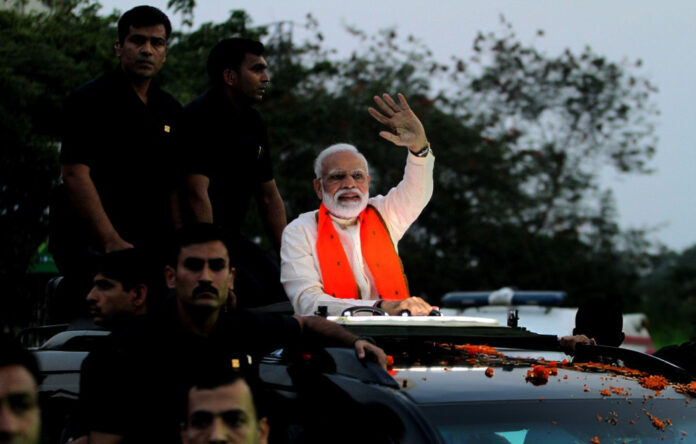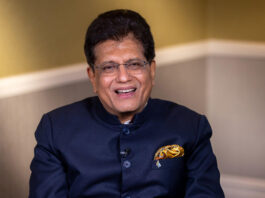Varanasi, September 11, 2025 — Prime Minister Narendra Modi is set to hold a high-profile roadshow in Varanasi on Thursday as he welcomes Mauritius Prime Minister Navinchandra Ramgoolam, who is on an official visit to India from September 9 to 16. The two leaders will engage in bilateral discussions in the spiritually significant city, highlighting the historic and cultural linkages that define India-Mauritius relations.
Mauritian PM Ramgoolam, who arrived in Varanasi on September 9, was received with ceremonial honours, including a Guard of Honour and a traditional welcome by Uttar Pradesh Governor Anandiben Patel. His presence in Varanasi marks an important moment in the ongoing diplomatic engagement between New Delhi and Port Louis.
PM Modi is expected to meet PM Ramgoolam at approximately 11:30 AM, followed by the Varanasi roadshow, where both leaders will be seen in a display of strong bilateral camaraderie. Later in the day, PM Modi will shift focus to national concerns as he heads to Dehradun to conduct an aerial survey of flood-affected areas in Uttarakhand at 4:15 PM, and subsequently chair a high-level review meeting at 5:00 PM.
A Meeting of Civilizational Bonds
The choice of Varanasi as the venue for this diplomatic engagement carries weight. Regarded as one of the oldest living cities in the world, Varanasi symbolizes the deep-rooted spiritual and civilisational ties between India and Mauritius. The large Indian diaspora in Mauritius — many tracing their roots back to Uttar Pradesh and Bihar — shares a profound connection with the sacred city.
These enduring cultural bonds have laid the groundwork for a robust people-to-people relationship, which both governments continue to nurture through educational, spiritual, and development initiatives.
Bilateral Agenda: From Heritage to High-Tech
The agenda for Thursday’s meeting is comprehensive and forward-looking. The two prime ministers will review the entire spectrum of cooperation, with a particular focus on development partnership and capacity building. The dialogue is expected to strengthen existing programs and identify new avenues of cooperation.
Key areas on the table include:
- Health and Education: Building upon past collaborations in telemedicine and scholarship programs for Mauritian students in Indian institutions.
- Science & Technology: Joint research programs and knowledge exchange in cutting-edge domains.
- Energy and Infrastructure: Developing clean energy solutions and enhancing maritime infrastructure.
- Digital Public Infrastructure: Replicating India’s successful digital services framework to boost governance and service delivery in Mauritius.
- Blue Economy: Leveraging maritime resources sustainably while securing oceanic territories.
- Renewable Energy: Joint efforts under the International Solar Alliance, co-founded by India.
This multidimensional cooperation reflects the shared commitment to inclusive and sustainable development, aligned with the broader aspirations of the Global South.
Legacy of Strategic Engagement
This week’s bilateral engagement is a continuation of the diplomatic momentum initiated during PM Modi’s state visit to Mauritius in March 2025, when both leaders upgraded the relationship to an Enhanced Strategic Partnership. That visit saw significant agreements across various sectors, from maritime security to fintech collaboration.
India’s foreign policy approach toward Mauritius is framed by two key strategies: the ‘Neighbourhood First’ policy and the MAHASAGAR Vision (Mutual and Holistic Advancement for Security and Growth Across Region). Under this strategic outlook, Mauritius is regarded not just as a friendly neighbour, but also as a critical partner in the Indian Ocean Region (IOR).
As maritime democracies, both nations have shown increased synergy in the maritime domain, whether through joint naval exercises, coastal surveillance agreements, or the development of strategic infrastructure. These developments not only enhance bilateral security but contribute to regional stability.
Mauritius: A Pillar of India’s Indian Ocean Strategy
Mauritius’s geo-strategic location in the southwestern Indian Ocean makes it vital to India’s broader Indo-Pacific strategy. Over the past few years, India has significantly ramped up financial and technical assistance to Mauritius, contributing to projects like the Metro Express, the ENT Hospital, and several social housing schemes.
The island nation, home to a vibrant population of Indian origin, has consistently supported India’s initiatives at international forums, including the International Solar Alliance, the Coalition for Disaster Resilient Infrastructure (CDRI), and calls for United Nations Security Council reform.
By deepening ties with Mauritius, India also reinforces its standing as a responsible regional power that promotes South-South cooperation, particularly in areas such as climate change, digital governance, and health equity.
Flood Crisis in Uttarakhand Draws PM’s Attention
While the focus of the morning remains diplomatic, the latter half of Thursday will see PM Modi addressing the urgent crisis in Uttarakhand, which has been facing severe flooding due to relentless rainfall. The Prime Minister will conduct an aerial assessment of the affected regions, including vulnerable districts along riverbanks and hilly terrain.
The situation in the Himalayan state has caused widespread disruption, with damage reported to infrastructure, agriculture, and residential areas. Several rescue and relief operations are underway, coordinated by the National Disaster Response Force (NDRF), state authorities, and the Indian Army.
PM Modi is expected to take stock of the relief measures and issue further directives during the review meeting in Dehradun at 5:00 PM. Officials from the Prime Minister’s Office, Ministry of Home Affairs, and Uttarakhand State Disaster Management Authority will be present.
A Day of Strategic Significance
Thursday’s itinerary underscores the multifaceted role of India’s leadership, balancing global diplomacy with domestic governance. PM Modi’s engagement with Mauritius PM Ramgoolam affirms India’s sustained commitment to deepening partnerships with key island nations, particularly those within the Indian Ocean.
At the same time, the Prime Minister’s immediate response to the Uttarakhand floods reflects the Centre’s emphasis on rapid disaster response, ensuring that both developmental diplomacy and internal crisis management go hand in hand.
The Varanasi roadshow, set against the backdrop of ancient temples and crowded ghats, will likely offer symbolic imagery of India’s cultural openness and diplomatic strength. For Mauritius, a country that shares religious and linguistic bonds with India, the visit is more than political — it’s a reaffirmation of a long-standing civilisational connection that continues to evolve with the times.
As India steers its course through a dynamic regional and global landscape, days like these highlight the strategic intersections of foreign policy, cultural identity, and governance responsiveness.




